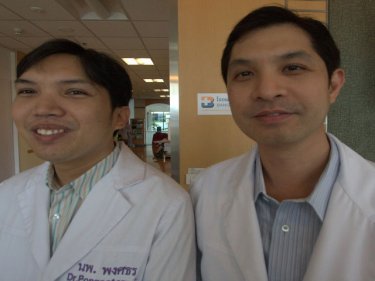Phuketwan spoke this week with Dr Piyapas Pichaichanarong and Dr Pongsatorn Sanguanchua, who are among eight plastic surgeons at Bangkok Hospital Phuket.
Dr Pongsatorn was delayed because he had an urgent trauma case to treat in surgery. This was a demonstration of the two very different worlds of these surgeons.
Motorcycle crashes on Phuket produce a constant stream of pressing trauma cases that require immediate attention, and often, ongoing surgery. Nothing illustrates the harm done in motorcycle mishaps more than the time and energy required by surgeons to patch people back together.
And it has to be said that, in some cases, even skilled surgeons cannot fully repair the damage. The cost to individuals, families and the island's economy is enormous. It's a particularly Asian tragedy.
By contrast, most of the overseas patients come for treatment of a particularly Western malady: obesity. Dr Piyapas says that people come mostly from the US, Europe and Australia for gastric banding to reduce their appetite, liposuction, and the tightening of loose skin.
''For many it's a quality of life thing,'' Dr Piyapas said. ''They are mostly baby-boom generation folk who have lost the battle to stay trim and healthy, and need a surgeon's help to begin to enjoy life again.''
Dr Piyapas says that the mental aspect is every bit as important as the surgery itself: it's pointless operating on someone who will go back to their old eating habits later.
So, he says, extensive psychological checks are required on patients before they go under the knife. Price is perhaps the big reason for patients coming to Phuket.
A breast reduction that might cost $25,000 in the US can be had for about $3000 on the island, while the cost of an operation on Phuket is about one third what you'd pay in Australia.
''The standard is better,'' Dr Piyapas said. ''Most of these operations are performed at day clinics but on Phuket, hospitals take better care.''
Bangkok Phuket also keeps in touch with patients, to make sure there are no unanticipated complications. Dr Piyapas says there are unhappy patients, but no more or less than in other parts of the world.
''It's a very low percentage,'' he said. Deep vein thrombosis is one of the after-effects that treatment is designed to try to avoid.
Dr Piyapas, 42, has been on the staff at Bangkok Hospital Phuket since before the 2004 tsunami. Dr Pongsatorn is a relatively recent arrival. They and the other surgeons perform about 300 operations a month, of which 70 to 80 are cosmetic surgery.
Phuket's plastic surgeons would prefer in future to avoid tsunamis and tragedies like the 2007 holiday plane crash that killed 90 and left many of the 40 survivors with burns and jarring injuries.
However, the experience in dealing with disasters, especially those on motorcycles on a daily basis, gives them plenty of experience to cope with often self-inflicted over-eating complaints.
That balance between Asia and the West, between disaster and over-indulgence, is part of the Phuket experience.





Good article and good advice for patients who are considering weight loss surgery.
Good to know that medical tourism to Phuket is not effected by political unrest in Thailand, this needs to be resolved.
Please share your medical tourism experience on www.TourNCare.com for helping other patients to make an informed decision.
Posted by TourNCare on May 10, 2010 16:43